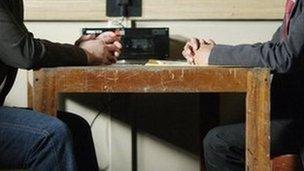Q&A: Detaining suspects in Scotland
- Published

A suspect can be held forcibly in a police station for a maximum of 12 hours
What does it mean when police "detain" a suspect?
It is a formal legal procedure used in investigations of cases which would be punishable by imprisonment.
A suspect can be held forcibly in a police station for a maximum of 12 hours to allow him or her to be questioned about their suspected involvement in a crime.
The clock begins to tick once the suspect has been told they are being detained under Section 14 of the Criminal Procedure (Scotland) Act, 1995, external.
In complex cases, or where there was a delay in questioning perhaps because where it took some time for the detainee to be brought to the police station, a senior officer can authorise an extension of a further 12 hours, to a total of 24 hours.
While the period of detention is usually limited to 12 hours, a senior police officer can sanction a further period of 12 hours, meaning a total of 24.
The detainee is allowed appropriate breaks during questioning, for drinks, food or sleep if necessary. DNA or other samples may be taken, but only if they are necessary to the investigation of the case.
Detainees are not required to answer any questions other than to confirm details such as their name, address and date of birth.
But they will be "cautioned" meaning that while they need say nothing, anything they do say will be noted and may be used in evidence.
For their part, police are entitled to question the detainee regarding their suspected involvement in a crime.
They must give details of the crime being investigated, but may not stray into questioning about other offences.
Since the landmark Cadder case in the UK Supreme Court in 2010, a detainee is entitled to have a lawyer give him advice by telephone, in person or to have a lawyer present during the interview.
During questioning, if a detainee gives information which provides him with a defence or alibi, the police are obliged to check whether it is true or not.
Once the period of detention is over, the detainee must be released or arrested and charged.
If arrest, which is the beginning of formal legal proceedings, has taken place, the accused person can either be released or detained in custody to appear in court.
If a detainee is released they can be charged at a later date - but may not be detained a second time.
In Scotland there is no system of police bail as in England, where a suspect can be bailed to return to the police station at a later date for further questioning.